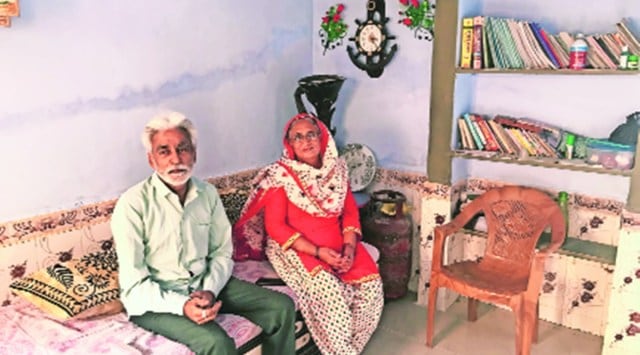A first-gen scholar, Ayesha Banu’s last words: ‘I’m like wind… don’t want to stop for anyone’
Born in a humble middle-class family in Ahmedabad, Ayesha was the first among the four siblings to pursue higher education. Even today, her parents have kept her economics books, notes for competitive exams and a few religious books on the shelves as a reminder.
 Liaqat Ali and Hoormat Banu, parents of Ayesha Banu, at their house in Vatva of Ahmedabad. Express
Liaqat Ali and Hoormat Banu, parents of Ayesha Banu, at their house in Vatva of Ahmedabad. ExpressOn the afternoon of February 25 last year, 23-year-old Ayesha Banu Makrani arrived at the Sabarmati riverfront—a popular spot that gets deserted in the noon hours due to the blazing sun—in Ahmedabad.
Moments before she took her life by jumping into the Sabarmati river, Ayesha, a second-year student of MA Economics in Ahmedabad, recorded a two-minute-long video wherein she claimed she was taking the extreme step out of her own will. Her last words were, “I am like wind. I just wish to flow and keep flowing and not stop for anyone. Alvida.” She sent the video to her parents and husband Aarif Khan, with whom her family was locked in a bitter dispute.
A day later, the video went viral on social media, sparking outrage as people demanded justice for the victim. Taking cognizance of the video, AIMIM chief and MP Asaduddin Owaisi said at a rally: “It is not mardangi (machoism) to assault or torture your wife.”
 Ayesha, a second-year student of MA Economics in Ahmedabad, took her life by jumping into the Sabarmati river.
Ayesha, a second-year student of MA Economics in Ahmedabad, took her life by jumping into the Sabarmati river.
On Thursday, almost 14 months after her death, a sessions court in Ahmedabad sent Aarif Khan (25) to 10 years rigorous imprisonment for abetting her suicide. In the 119-page-long judgment order, the court of additional sessions judge Chirayu S Adhyaru relied on past conversations of Ayesha with her father Liaqat Ali wherein she had mentioned instances of harassment from Aarif and his family, an FIR lodged in 2019 and a 72-minute-long telephonic conversation between Aarif and Ayesha just before she took the extreme step. In the transcript of the phone call retrieved by forensic experts, Aarif had abetted the suicide by coercing her to make a video absolving him of all charges before taking the extreme step.
Born in a humble middle-class family in Ahmedabad, Ayesha was the first among the four siblings to pursue higher education. Even today, her parents have kept her economics books, notes for competitive exams and a few religious books on the shelves as a reminder.
Her father Liaqat Ali, a tailor by profession, recalls the moment when Ayesha told she wanted to pursue a master’s degree. “I couldn’t have been more proud of my daughter. Despite humble beginnings, I had ensured that all four of my children—Heena, Aamir, Ayesha and Arman—get private schooling. Ayesha pursued BA in economics from Gujarat University and then took up the master’s course.
It was Ayesha who inspired the youngest sibling Arman to complete his graduation in political science.
“However, after the incident, Arman has lost interest in studies. When Ayesha was around, she used to scold him to study saying he deserved better in life,” said Ayesha’s mother Hoormat Banu.
A 20-year-old Ayesha was married to Aarif, a mines contractor based in Jalore of Rajasthan, in 2018. According to Ayesha’s family, Aarif was a distant relative and the marriage was arranged by the two families.
However, trouble started brewing barely months after the marriage as Ayesha returned home after a fight. In 2019, Ayesha lodged an FIR against Aarif and his family at the Vatva police station alleging dowry harassment and violence.
“I sold off a flat to arrange for the wedding. We also paid Rs 1.5 lakh in cash as dowry; yet, my daughter was mistreated. After her death, many people came forward and told me that they want to kill Aarif. I scolded them saying that I want the courts to punish him. Today, he has received maximum punishment under IPC 306 (abetment to suicide) for 10 years but I wish there were more stringent laws made for such cases,” said Ali.
He claims that after Ayesha’s demise, he received many offers of monetary support.
“I made an appeal through media channels that I don’t need any money but support from the public against Aarif. One day, I also received a call from the then state home minister Pradipsinh Jadeja who told me that whether it be Ayesha or Asha, no daughter of Gujarat has to face such torture. I was moved by his words,” said Ali.
It is the holy month of Ramzan and the Liaqat Ali family is observing roza together. But the void left by Ayesha is only getting larger each day. “She was the most jovial of all kids, who always used to liven up the house. We still have all the decorations she had done to the living room of our house,” said Ali.
However, he cautions that no woman should consider Ayesha a role model.
When asked why, Liaqat took out his phone and started playing a video in which a Burqa-clad woman, standing in front of the Sabarmati river, can be heard saying that she was going to take the extreme step, just like Ayesha, after being tired of the harassment from her in-laws.
“My Ayesha was a fighter and she wanted to live. She was coerced and gaslighted by this monster who told her that he will ‘follow’ her if she ends her life. If not for his cruelty, we would have seen Ayesha pursuing her MPhil now,” said Ali.












